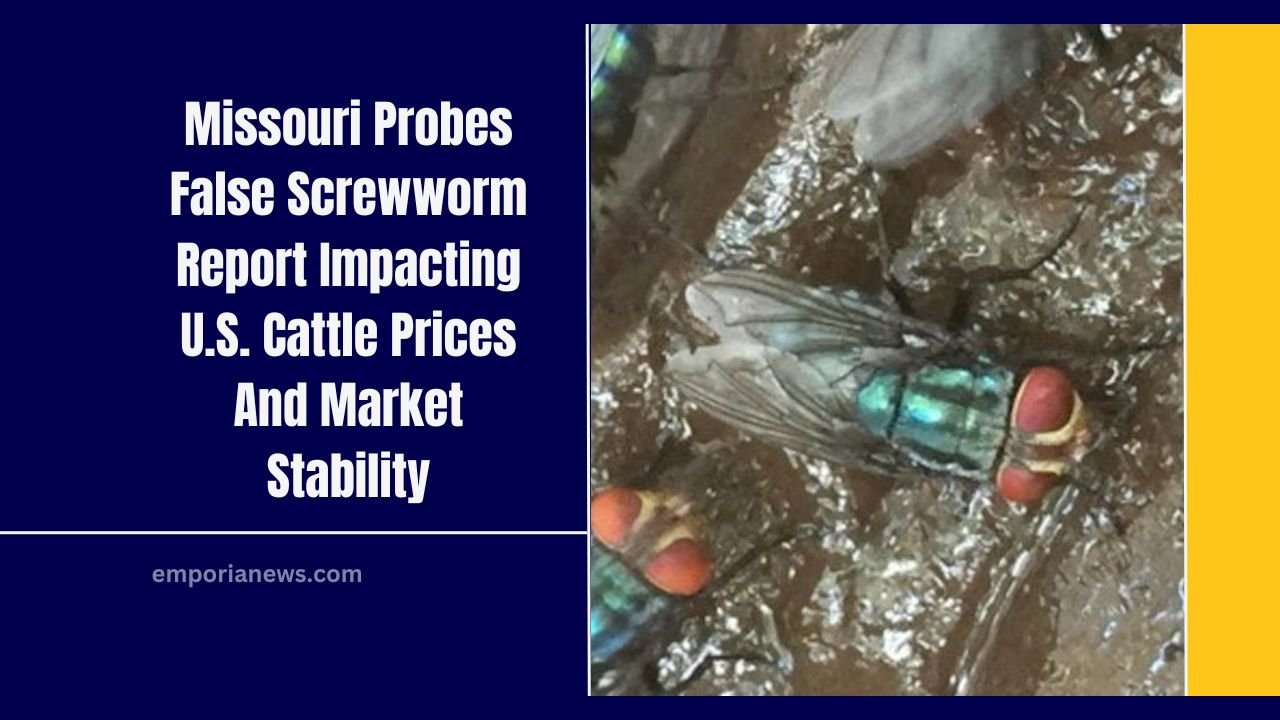In late May 2025, a fraudulent press release falsely claiming the detection of the New World Screwworm (NWS) in Missouri triggered a significant downturn in U.S. cattle futures markets.
This incident not only caused immediate financial repercussions but also raised concerns about market manipulation and the dissemination of misinformation in the agricultural sector.
The False Report and Its Immediate Impact
On May 27, 2025, a fabricated press release was sent to a northwest Missouri radio station, alleging the presence of New World Screwworm in the state.
The station published the report online, which quickly influenced market perceptions. As a result, live cattle futures on the Chicago Mercantile Exchange (CME) plummeted nearly 2%, with trading volumes surging by 77% compared to the previous week .
The Missouri Department of Agriculture promptly refuted the claims, stating that there were no confirmed cases of NWS in Missouri. Similarly, the U.S. Department of Agriculture (USDA) confirmed that reports of NWS detection in the United States were unfounded .
Understanding the New World Screwworm Threat
The New World Screwworm (Cochliomyia hominivorax) is a parasitic fly whose larvae infest the wounds of warm-blooded animals, feeding on living tissue and potentially causing death if untreated. The U.S. successfully eradicated NWS in 1966 through extensive efforts, including the release of sterile flies.
However, recent reports indicate that NWS has been spreading northward through Central America into Mexico, with detections approximately 700 miles from the U.S. border in the states of Oaxaca and Veracruz
USDA’s Response: Suspension of Livestock Imports
In response to the threat, the USDA suspended imports of live cattle, horses, and bison from Mexico on May 11, 2025, to prevent the potential spread of NWS into the United States .
This suspension is reviewed monthly and will remain in effect until significant containment progress is achieved.
To combat the spread, the USDA, in collaboration with Mexican authorities, has intensified efforts such as releasing sterile flies and enhancing surveillance measures .
Investigation into the False Report
The Missouri State Highway Patrol’s Rural Crimes Investigative Unit, along with the Livestock and Farm Protection Task Force and the State Attorney General’s Office, have launched an investigation to determine if the false report was a deliberate act aimed at manipulating agricultural markets
The cattle producers’ group R-CALF USA has formally requested the Commodity Futures Trading Commission (CFTC) to investigate the incident, emphasizing the potential threat to market integrity and the economic well-being of U.S. cattle producers .
Economic Implications
The dissemination of false information had immediate economic consequences:
- Live cattle futures experienced a nearly 2% drop.
- Trading volumes spiked by 77% compared to the previous week.
- Market volatility increased, affecting producers and traders relying on accurate information.
These events underscore the vulnerability of agricultural markets to misinformation and the importance of rapid response mechanisms to maintain market stability.
Key Events and Data
| Date | Event | Impact |
|---|---|---|
| May 11, 2025 | USDA suspends livestock imports from Mexico | Preventative measure against NWS spread |
| May 27, 2025 | False NWS report published in Missouri | Triggered nearly 2% drop in live cattle futures; 77% increase in trading volume |
| May 28, 2025 | R-CALF USA requests CFTC investigation | Seeks accountability for potential market manipulation |
| Ongoing | USDA and Mexican authorities collaborate on containment | Enhanced surveillance and sterile fly releases to control NWS spread |
The false report of New World Screwworm in Missouri highlights the critical need for vigilance against misinformation in agricultural markets.
Prompt actions by authorities and industry groups aim to safeguard market integrity and protect the livelihoods of producers. Ongoing efforts to contain the actual NWS threat remain a top priority for U.S. agriculture.




